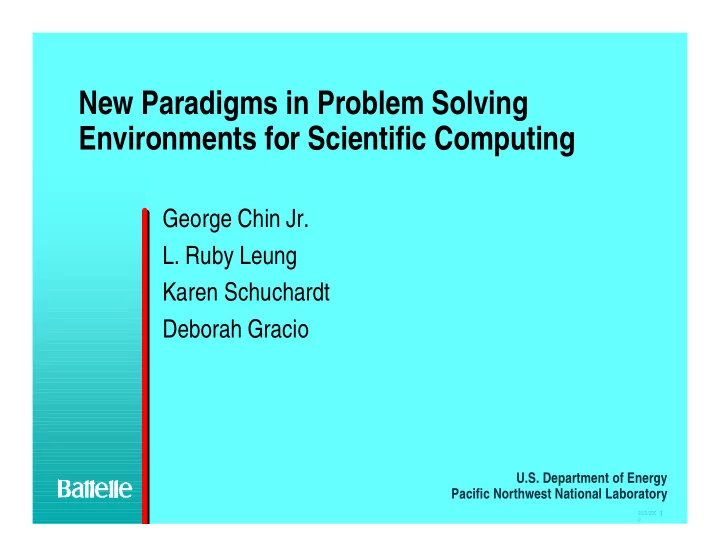

New Paradigms in Problem Solving Environments for Scientific Computing George Chin Jr. L. Ruby Leung Karen Schuchardt Deborah Gracio U.S. Department of Energy Pacific Northwest National Laboratory 2/20/200 1 2
Background I Pacific Northwest National Laboratory is one of nine U.S. Department of Energy R&D laboratories I Multi-purpose, multi-program laboratory I Wide range of disciplines from molecular biology to atmospheric sciences to manufacturing engineering I Basic and applied research I Information technology focus on supporting computational needs of scientists I Specific computational science R&D focus on scientific problem-solving environments U.S. Department of Energy Pacific Northwest National Laboratory 2 2/20/200 2
What is a Problem-Solving Environment? A PSE is a computer system that provides all the computational facilities necessary to solve a target class of problems… Overall, they create a framework that is all things to all people: they solve simple or complex problems, support rapid prototyping or detailed analysis, and can be used in introductory education or at the frontiers of science. - Gallopoulos, Houstic, and Rice, 1998 U.S. Department of Energy Pacific Northwest National Laboratory 3 2/20/200 2
Extensible Computational Chemistry Environment U.S. Department of Energy Pacific Northwest National Laboratory 4 2/20/200 2
Biology Workbench U.S. Department of Energy Pacific Northwest National Laboratory 5 2/20/200 2
Distribution of Scientific Computing UW ANL USGS ORNL PNNL UNC LBNL UC - Boulder NCAR Scripps SDSC U.S. Department of Energy Pacific Northwest National Laboratory 6 2/20/200 2
Access to Computational Resources U.S. Department of Energy Pacific Northwest National Laboratory 7 2/20/200 2
Context of Scientific Problem Solving Problem Solving involves “higher-order skills that encompass specific processes and abilities ” - Lauren Resnick, 1987 I Scientific processes • Experiments I Scientific abilities • Appropriate level of abstraction • Knowledge expression and dissemination U.S. Department of Energy Pacific Northwest National Laboratory 8 2/20/200 2
PSE Research and Development I Laboratory PSE research and development effort I Participatory analysis I Participatory design I Evolve scientific PSE architectures, environments, and tools I Target real scientific fields • Climate change modeling • Biomolecular research U.S. Department of Energy Pacific Northwest National Laboratory 9 2/20/200 2
Experimental Design and Execution I Provide high-level visual representation I Provide user control of experiment execution I Support scientists in design of experiments U.S. Department of Energy Pacific Northwest National Laboratory 10 2/20/200 2
Scientist’s Conceptual View of Research Processes U.S. Department of Energy Pacific Northwest National Laboratory 11 2/20/200 2
Scientific Workflow U.S. Department of Energy Pacific Northwest National Laboratory 12 2/20/200 2
High-Level Access to Computational Resources I High-level access to diverse computational resources I Conform to scientist’s level of understanding and abstraction I Place in context of the overriding computational experiment or model U.S. Department of Energy Pacific Northwest National Laboratory 13 2/20/200 2
Views of Data U.S. Department of Energy Pacific Northwest National Laboratory 14 2/20/200 2
Views of Processes U.S. Department of Energy Pacific Northwest National Laboratory 15 2/20/200 2
Knowledge Management and Dissemination I Gather procedural and domain knowledge I Facilitate accumulation and sharing of knowledge I Support both synchronous and asynchronous forms of knowledge gathering dissemination U.S. Department of Energy Pacific Northwest National Laboratory 16 2/20/200 2
Capture of Knowledge U.S. Department of Energy Pacific Northwest National Laboratory 17 2/20/200 2
In-Context Real-Time Collaboration U.S. Department of Energy Pacific Northwest National Laboratory 18 2/20/200 2
Areas of Research and Development I Visual programming models I Scientific workflow management I User-level data management I Scientific collaboratories I Adaptive environments • In-context collaboration capabilities • Automatic resource integration • Automatic workflow generation U.S. Department of Energy Pacific Northwest National Laboratory 19 2/20/200 2
Summary – Our Aims I Providing context for scientific problem solving I Contextual view of experiment I Appropriate level of abstraction for scientists I Automation of intricate, manual computer operations I Accumulation of domain context and knowledge I Expanding base of scientific users U.S. Department of Energy Pacific Northwest National Laboratory 20 2/20/200 2
Recommend
More recommend